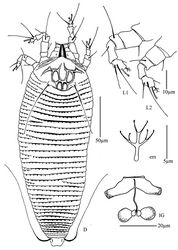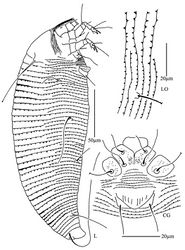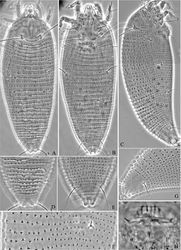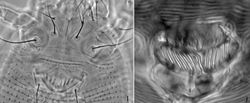Difference between revisions of "Aculops ulmi"
m (Imported from ZooKeys) |
m (1 revision) |
(No difference)
| |
Latest revision as of 16:25, 21 May 2012
| Notice: | This page is derived from the original publication listed below, whose author(s) should always be credited. Further contributors may edit and improve the content of this page and, consequently, need to be credited as well (see page history). Any assessment of factual correctness requires a careful review of the original article as well as of subsequent contributions.
If you are uncertain whether your planned contribution is correct or not, we suggest that you use the associated discussion page instead of editing the page directly. This page should be cited as follows (rationale):
Citation formats to copy and paste
BibTeX: @article{Li2012ZooKeys196, RIS/ Endnote: TY - JOUR Wikipedia/ Citizendium: <ref name="Li2012ZooKeys196">{{Citation See also the citation download page at the journal. |
Ordo: Trombidiformes
Familia: Eriophyidae
Genus: Aculops
Name
Aculops ulmi Hong & Xue, 2005 – Wikispecies link – Pensoft Profile
- Aculops ulmi Hong and Xue 2005[1]: 205, 209.
Redescription
Female. (n = 10) Body fusiform, light yellow, 192 (192–230), 70 (62–72) wide, 80 (80–81) thick. Gnathosoma 23 (23–25), projecting obliquely down, suboral plate present, pedipalp coxal seta (ep) 3 (2–4), dorsal pedipalp genual seta (d) 6 (5–6), cheliceral stylets 22 (22–25). Prodorsal shield 33 (33–34), 48 (48–51) wide, subtriangular; median, admedian and submedian lines present, median line ending at basal 1/4 of prodorsal shield, median and admedian lines connected at basal 1/4 of prodorsal shield, admedian and submedian lines connected at basal 2/3 of prodorsal shield, forming two cells on both sides of median line. Scapular tubercles on rear shield margin, 4 (4–5), 26 (26–28) apart, scapular setae (sc) 55 (55–60), projecting posteriorly, knobbed at the end. Coxigenital region with 7 (6–7) annuli, with triangular microtubercles. Coxisternal plates with short lines and granules, anterolateral setae on coxisternum I (1b) 13 (10–13), 14 (14–15) apart, proximal setae on coxisternum I (1a) 30 (27–30), 11 (11–13) apart, proximal setae on coxisternum II (2a) 54 (54–57), 26 (26–28) apart, tubercles 1b and 1a 7 (7–8) apart, tubercles 1a and 2a 9 (9–10) apart. Prosternal apodeme combined, 7 (5–11). Leg I 31 (31–35), femur 10 (9–12), basiventral femoral seta (bv) 12 (11–14); genu 5 (5–6), antaxial genual seta (l") 22 (22–29); tibia 7 (7–9), paraxial tibial seta (l’) 6 (6–8), located at 1/3 from dorsal base; tarsus 8 (8–11), seta ft’ 16 (16–18), seta ft" 20 (20–25), seta u’ 6 (5–6); tarsal empodium (em) 6 (6–7), simple, 2-rayed, tarsal solenidion (ω) 9 (8–10), slightly knobbed. Leg II 28 (28–31), femur 9 (9–11), basiventral femoral seta (bv) 12 (11–12); genu 5 (5–6), antaxial genual seta (l") 9 (9–13); tibia 5 (5–7); tarsus 9 (9–10), seta ft’ 7 (6–7), seta ft" 18 (18–20), seta u’ 5 (4–5); tarsal empodium (em) 6 (6–7), simple, 2-rayed, tarsal solenidion (ω) 8 (8–11), slightly knobbed. Opisthosoma dorsally with 35 (22–38) annuli, with triangular microtubercles, ventrally with 55 (55–56) annuli, with triangular microtubercles. Setae c2 16 (14–16) on ventral annulus 10 (10–11), 61 (61–69) apart; setae d 57 (55–65) on ventral annulus 21 (21–22), 50 (48–50) apart; setae e 14 (12–19) on ventral annulus 33 (32–34), 23 (23–24) apart; setae f 27 (26–30) on ventral annulus 51 (49–53), 21 (19–21) apart. Setae h1 3 (3–4), h2 90 (85–90). Female genitalia 11 (11–14), 23 (22–23) wide, coverflap with 8 longitudinal ridges, setae 3a 17 (17–22), 17 (16–17) apart.
Male. Unknown.
Type material
Hong and Xue (2005)[1] described types as follows: Holotype female (slide number 17.viii.2003), from Ulmus sp. (Ulmaceae), Xingtai city, Hebei Province, P. R. China, coll. Xiao-Feng Xue. Paratypes (slide number 17.2003). 9 females and 2 males. All types here were re-examined. Female genitalia coverflap with 10–12 longitudinal ridges.
Additional material
6 females (slide number NJAUEri792) from Ulmus sp. (Ulmaceae), Xining, Qinghai Province, P. R. China, 36°38'18"N, 101°45'27"E, elevation 2241m, 21 July 2007, coll. Xiao-Feng Xue.
Relation to host
Vagrant on leaf lower surface. No damage to the host was observed.
Distribution
China (Hebei, Qinghai).
Notes
Instead of the original description: female genitalia coverflap smooth, female genitalia coverflap is with 8 longitudinal ridges in this redescription.
Taxon Treatment
- Li, H; Xue, X; Hong, X; 2012: Eriophyoid mites from Qinghai Province, northwestern China with descriptions of nine new species (Acari, Eriophyoidea) ZooKeys, 196: 47-107. doi
Other References
- ↑ 1.0 1.1 Hong X, Xue X (2005) Four new species of Aculops Keifer (Acari: Eriophyoidea: Eriophyidae) from China. Oriental Insects 39: 203-211. doi: 10.1080/00305316.2005.10417433
Images
|



